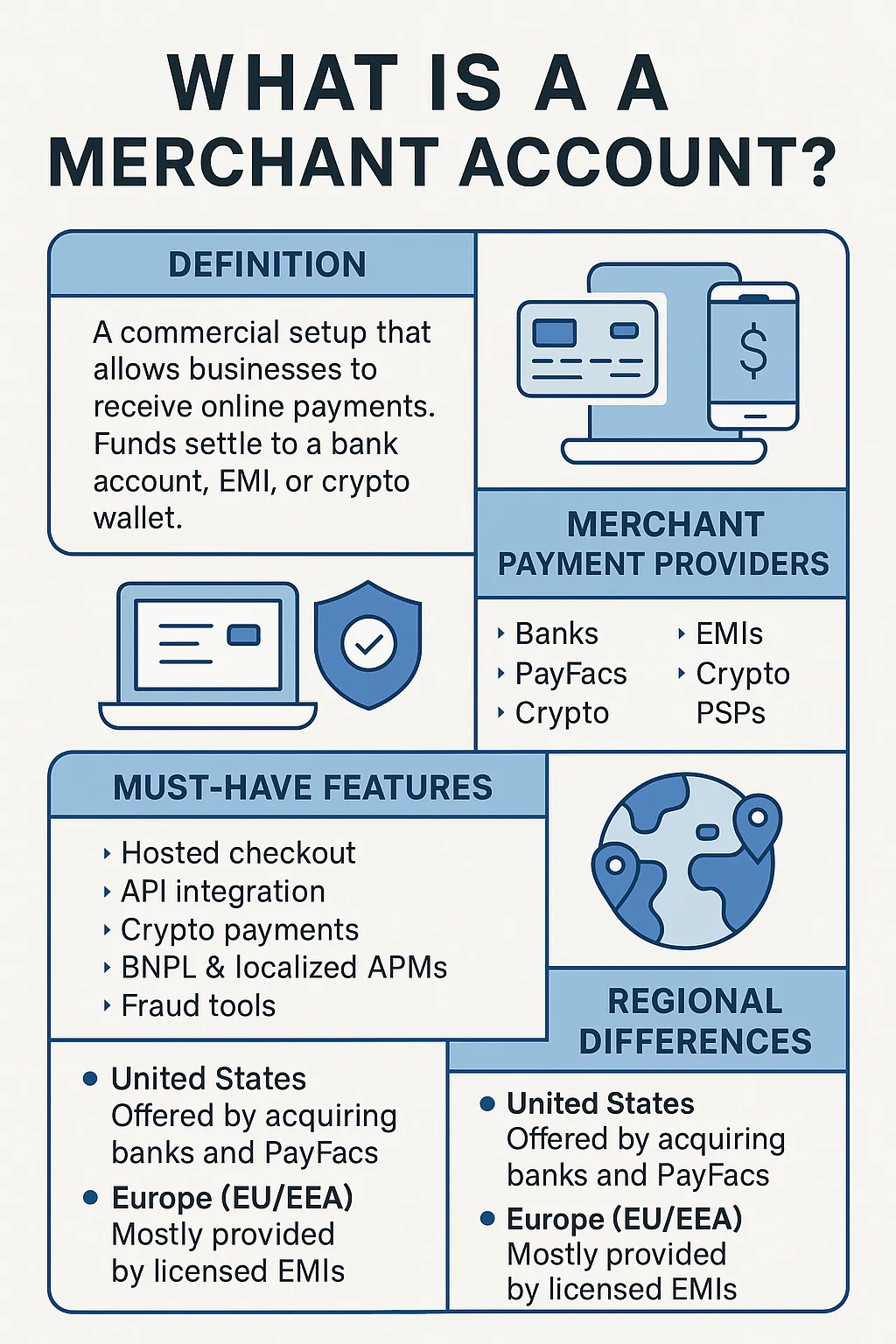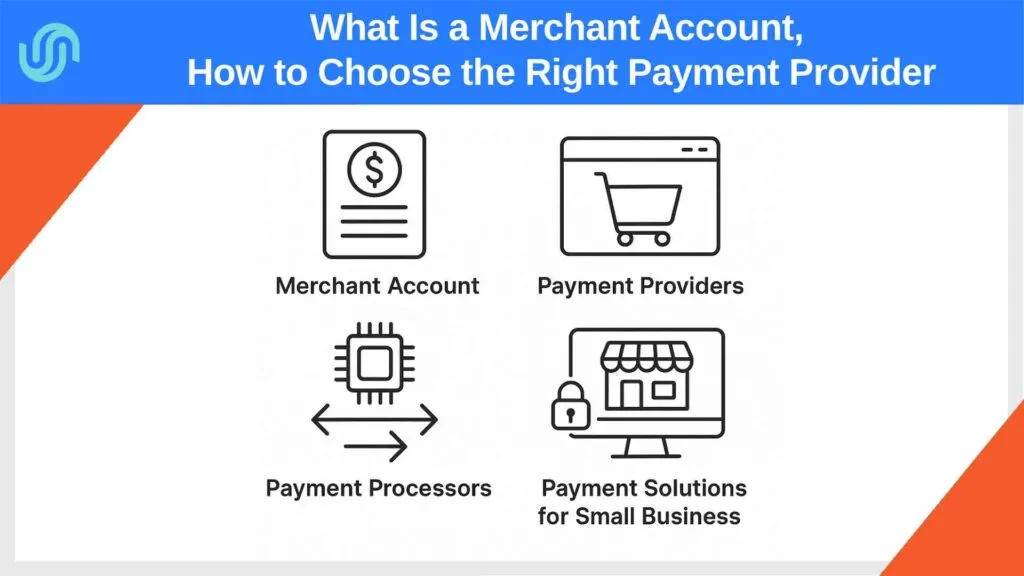In today’s global e-commerce ecosystem, knowing what is a merchant account is no longer optional — it’s essential. Whether you’re launching a SaaS platform, a crypto exchange, or a niche online store, the way you accept payments can determine your success or failure.
According to the Worldpay Global Payments Report 2024, by 2027 $13.9 trillion in global transaction value spent via digital wallets in 2023, accounting for 50% of e-commerce — making traditional merchant setups insufficient for global growth.
This guide will walk you through the merchant services basics — including how merchant payment providers, different payment processors, and business payment service providers differ depending on your market, risk level, and business model.
What Is a Merchant Account?

A merchant account is a financial arrangement that allows businesses to accept online payments from customers via credit cards, debit cards, wallets, or even cryptocurrency. Traditionally, this meant a commercial bank account used for settlements after authorization by a card network. Today, merchant accounts can also be:
- Issued by EMIs (Electronic Money Institutions) like Payoneer or Wise;
- Routed to crypto wallets (e.g., via BitPay, Mercuryo, or Coingate);
- Managed by PayFacs or full-stack PSPs (e.g., Stripe, Rapyd).
The key function is the same: to hold customer funds temporarily after transaction approval and before payout to your operational wallet or account.
Merchant Accounts: Regional Differences
Your country of registration and target customer base significantly affect your merchant setup:
- United States: Most merchant accounts are issued by acquiring banks (e.g., Wells Fargo, Bank of America) or PayFacs (e.g., Square, Stripe). KYC is strict, and high-risk industries often face rejection.
- Europe (EU/EEA): Merchant services are commonly offered by PSD2-licensed EMIs like Mollie, Paysera, or Wise. These providers offer SEPA support and lower entry barriers.
- Asia: Digital wallets like Paytm, or Alipay dominate. Most transactions don’t go through traditional merchant accounts but via wallet-based ecosystems.
- LATAM and Africa: Local payment processors support settlement to mobile wallets and regional banks. Examples: MercadoPago (LATAM), Paystack (Africa), often using local APMs.
Note: If your PSP doesn’t support the required jurisdictions or local payment options, your conversion rates could drop by 30% or more.
Different Payment Processors and Gateways
Payment processors are companies that route payment information between your checkout, customer bank, card network (e.g., Visa/Mastercard), and the acquiring bank or PSP.
They come in several forms:
- Direct processors like Worldpay or Fiserv
- Gateways like Nuvei (often PCI DSS-compliant)
- Full-stack platforms like Checkout.com or Adyen (combine processing + gateway)
Choosing between them depends on:
- Regions you serve
- Industry risk level (e.g., adult, crypto, forex)
- Volume and chargeback risk
- Need for modular integration or all-in-one simplicity
Merchant Payment Providers: From Banks to EMIs to Crypto PSPs
A merchant payment provider offers the infrastructure, licenses, and compliance services to help you legally and securely accept payments.
They may be:
- Acquiring banks (e.g., Chase, Barclays)
- EMIs like Payoneer or Paysera
- PSPs like Stripe, Rapyd, Nuvei
- Crypto-native PSPs like BitPay or Mercuryo
The best business payment service provider depends on your:
- Legal entity location
- Supported industries (some refuse iGaming, CBD, adult)
- Currencies (e.g., USD, EUR, AED, USDT, BTC)
- Settlement speed (T+1 vs T+7)
- Access to local payment methods
Pro tip: Always verify licenses via public databases like the FCA register or EBA register.
Must-Have Features of Modern Online Payment Solutions
If you’re looking for scalable payment solutions for small business, make sure your provider offers:
✅ Hosted Checkout Pages
Quick-launch checkout without backend development. Ideal for MVPs and SaaS platforms.
✅ API-Based Integrations
Flexible options for full-stack developers. Perfect for marketplaces, platforms, and subscription logic.
✅ Crypto Payment Gateways
Let customers pay with Bitcoin, Ethereum, or stablecoins. Reduce banking friction and access Web3 users.
✅ BNPL & Localized APMs
Add Klarna, Afterpay, Pix (Brazil), GCash (Philippines), or UPI (India) to boost conversions in emerging markets.
✅ Fraud & Chargeback Monitoring
Real-time risk analysis, 3D Secure 2.0, and automated chargeback responses protect your margins.
Modern PSPs like Adyen or Checkout.com support all the above in a single platform.
Payment Solutions for Small Business in 2025
The needs of small online businesses differ from enterprise merchants. What matters:
- Low or no setup fees
- APM and crypto support
- PCI DSS-compliant hosted checkout
- Local language interfaces for global customers
- Fast settlements with minimal reserves
Many businesses start with Stripe or PayPal, but outgrow them due to high fees, account holds, or country restrictions. Upgrading to modular PSPs allows better control and expansion.
Common Mistakes to Avoid
- ❌ Using a PayFac that doesn’t support your business model (e.g., adult, forex, or crypto).
- ❌ Ignoring fraud tools or not setting 3DS rules.
- ❌ Not negotiating reserve/rolling hold policies.
- ❌ Using only card payments without local APMs or wallets.
Final Thoughts About What Is a Merchant Account
Merchant services in 2025 are more flexible than ever — but also more fragmented. Knowing what is a merchant account, understanding merchant payment providers, evaluating different payment processors, and choosing a reliable business payment service provider can mean the difference between rapid scaling and lost revenue.


